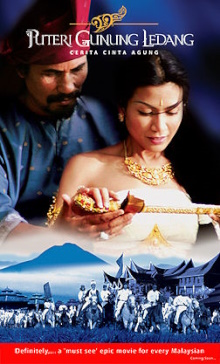This is probably one of the great Malaysian films, being a historical epic that was at its time the most expensive production yet made. Pretty much every Malaysian will have learned the story which should be considered one of the country’s founding myths. This cinematic version has the great Malay hero Hang Tuah being forced to choose between loyalty to his ruler, the Sultan of Malacca and his love for the titular princess. I was skeptical of this being any good as I don’t have high hopes for Malaysian films but it actually exceeded my expectations. Director Saw Teong Hin leveraged the limited resources at his disposal to create a film that isn’t a literal representation but a stylized, mythic one that is perfectly suited to the legend.
Gusti Putri Retno Dumillah, a princess of the Majapahit Kingdom, travels to Malacca against the wishes of her brother Gusti Adipati who rules the kingdom and settles on top of Mount Ledang. She had met the Malaccan warrior Hang Tuah on a state visit some time ago and the two have fallen in love with each other. When the Majapahit Kingdom is attacked by the Sultanate of Demak, her brother at first offers her hand in marriage in exchange for peace but is enraged to find her gone. Next, he travels to Malacca to ask for military support from Sultan Mahmud. The sultan is already married and has a small child as his heir but this doesn’t prevent him from wanting to marry Gusti Putri in return for the alliance. Everyone is aware that the princess and Hang Tuah have feelings for one another but he swears that he is loyal to his sultan above all else. The sultan then orders Hang Tuah and another warrior Tun Mamat to lead a delegation to the peak of Mount Ledang to propose marriage to the princess on his behalf. In response, the princess uses magic to impede the delegation.
As far as I know, reimagining this legend as a romance between Hang Tuah and the princess is wholly an invention of scriptwriter Mamat Khalid. The original source material, so far as it exists anyway, only has the warrior being asked to lead the delegation but he never made it to the peak as he was by then too old. It is a fantastic idea that adds impetus to the famously impossible gifts demanded by the princess to agree to marry the sultan. With its limited budget, the film can’t really recreate the Malacca of the 15th century, but its stylized representation works well enough and the interior of the sultan’s palace looks suitably grand. This extends to the supernatural abilities wielded by the princess and her brother. At first glance, it looks silly how the characters are able to telepathically communicate with one another at long distance but the actors play the role so seriously while the bystanders realistically look around in confusion that the film manages to sell the illusion. Many of the tricks are reminiscent of the ones Tsui Hark used to pull off. As I mentioned last time, this kind of symbolic portrayal works better and feels more respectful than taking a realistic, literal approach when it comes to the stuff of myth and legend.
Since this is a Malaysian film and Hang Tuah is a bastion of the Malay cultural identity, there was no way they would be able to portray a romance in the Western manner with kisses and caresses. Instead, the princess and Hang Tuah dance around each other with elaborate hand movements, never touching, and use Malay poetry to convey the depth of their feelings. It works wonderfully and I think constitutes a great addition to the visual language of romance in cinema. I also found it quite thrilling that the film dares to portray the Sultan Mahmud Shah in a decidedly bad light. His existing wife berates him for his lustful motives in wanting to marry the princess and he seems quite willing to fulfill the princess’ impossible demands, including a bowl of the blood of his own son. Finally it’s another iteration of the great conflict at the heart of Hang Tuah between duty and loyalty to his ruler and his own personal life. He is most famous for choosing his sultan over his own best friend and this story can be interpreted as another way of seeing his character.
To be fair, this isn’t a great film in terms of production values and many of the performers are visibly weak in their roles. I believe that the director did an impressive job at extracting what he could from their skills, looks and the budget he had but he isn’t able to work miracles. I’m also unsure how well this film would come across to non-Malaysians who know nothing about Malacca or Hang Tuah. For me this is far better than I expected and I would recommend it to all Malaysians.
